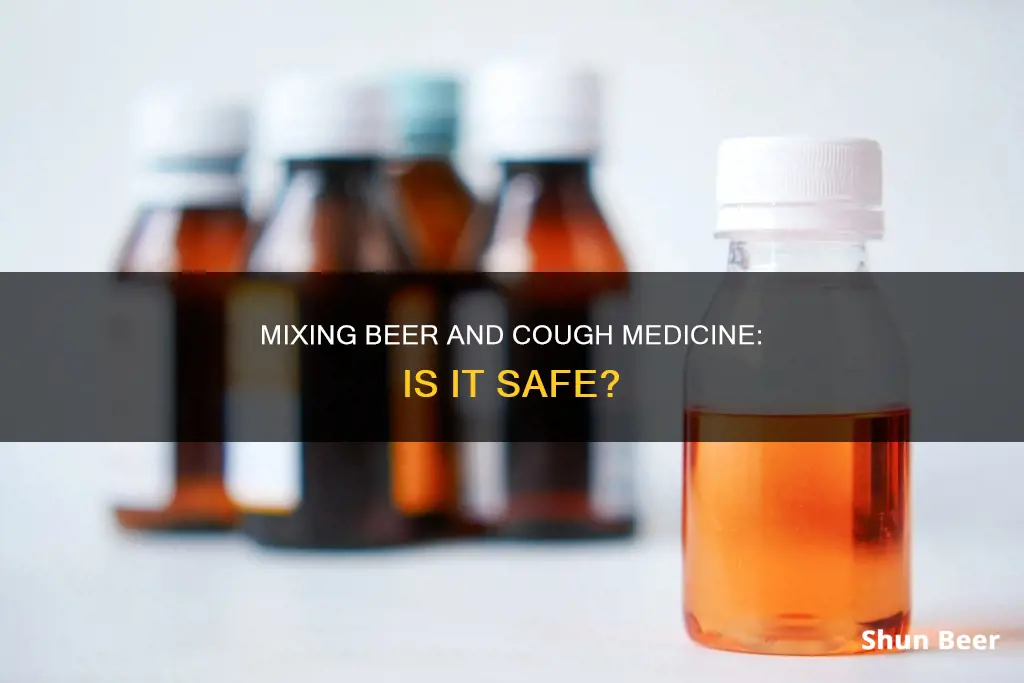
Drinking alcohol with cough medicine is not recommended. Cough syrup often contains dextromethorphan, a central nervous system (CNS) depressant that can cause relaxation, sleepiness, and a euphoric feeling. Alcohol has a similar effect on the body, and mixing the two can lead to increased dizziness, drowsiness, impaired coordination, and even more severe effects if the cough medication already contains alcohol. It is best to avoid alcohol while taking any cough medication and to opt for alcohol-free cough syrup formulations if you want to avoid alcohol in your medication.
| Characteristics | Values |
|---|---|
| Can I drink beer with cough medicine? | It is not recommended to mix beer with cough medicine. |
| Why? | Beer and cough medicine are both central nervous system (CNS) depressants, which can increase the risk of overdose, respiratory depression, and even death. |
| Effects of mixing beer and cough medicine | Increased dizziness, drowsiness, impaired coordination, nervousness, upset stomach, diarrhea, constipation, memory loss, cognitive impairment, emotional and behavioral changes, and permanent psychosis. |
| Examples of cough medicine ingredients that interact with beer | Dextromethorphan, codeine, oxycodone, and acetaminophen. |
| Alternatives to drinking beer while taking cough medicine | Non-alcoholic drinks, drug-free ways to treat a cough (e.g. honey, non-medicated cough drops, humidifier, or plenty of fluids). |
What You'll Learn
- Dextromethorphan and alcohol can cause severe nausea and vomiting
- Mixing the two can lead to irregular, slowed, or stopped breathing
- Cough syrup and alcohol don't mix well and can cause drowsiness and dizziness
- Drinking alcohol while sick can worsen symptoms, cause dehydration, and weaken the immune system
- Alcohol can interfere with the way your body processes medications

Dextromethorphan and alcohol can cause severe nausea and vomiting
Dextromethorphan is a central nervous system (CNS) depressant that causes feelings of relaxation, sleepiness, and euphoria. Alcohol has a similar effect on the body. Mixing CNS depressants is very dangerous because their combined side effects can increase the risk of overdose.
Dextromethorphan is an ingredient in many over-the-counter (OTC) cough medicines. It is a cough suppressant that can be found in gel capsules, chewable tablets, dissolving strips, liquid solutions, extended-release liquids, lozenges, and some throat sprays. It is also often found in antihistamines, decongestants, and other cough suppressants.
When people take too much dextromethorphan, they might experience hallucinations and "out-of-body" sensations. It also depresses brain function, particularly in the areas that control breathing and heart function. Taking large amounts of dextromethorphan can cause dangerous side effects, including loss of consciousness, seizures, brain damage, and death.
Mixing dextromethorphan and alcohol can be extremely dangerous and can lead to severe nausea and vomiting. The combination of these two substances can cause additive side effects, increasing the risk of overdose, respiratory depression, and even death. Dextromethorphan, on its own, is a widely abused drug. When mixed with alcohol, it can cause severe nausea and vomiting, as well as other dangerous side effects such as respiratory depression, brain lesions, and permanent psychosis.
It is important to note that some cough syrups also contain a small amount of alcohol, which can further increase the risk of adverse effects. Therefore, it is generally advisable to avoid drinking alcohol when taking any medication, including cough medicine containing dextromethorphan.
Beer and Anemia: Is It Safe to Drink?
You may want to see also

Mixing the two can lead to irregular, slowed, or stopped breathing
Drinking alcohol with cough medicine can have severe consequences. Both alcohol and dextromethorphan (DXM), a common ingredient in cough syrups, are central nervous system (CNS) depressants. CNS depressants cause feelings of relaxation, sleepiness, and euphoria. When mixed, the effects of both substances are amplified, increasing the risk of overdose.
The combination of alcohol and DXM can lead to irregular, slowed, or stopped breathing, also known as respiratory depression. This is a severe condition that can be life-threatening. Alcohol enhances the nervous system side effects of DXM, including dizziness, drowsiness, and difficulty concentrating. The mixture can also cause impairment in thinking and judgment.
The National Capital Poison Center reports that over 6,000 people visit emergency rooms annually due to DXM toxicity or overdose. When DXM is misused, larger doses are taken to achieve a high or hallucinogenic effect. Mixing DXM with alcohol increases the duration of its effects, which can last for several days.
Additionally, the co-use of alcohol and DXM can lead to severe nausea and vomiting, which may also last for hours. The mixture can also cause dissociative effects, such as feeling out of body, which can trigger panic. Furthermore, there is a risk of brain lesions, which can result in memory loss, cognitive impairment, and emotional and behavioral changes.
It is crucial to avoid mixing alcohol with any cough medication, especially those containing DXM or codeine. These combinations can have dangerous interactions, increasing the risk of overdose, respiratory depression, and even death.
Hydrometer Basics: Crafting Beer Perfection
You may want to see also

Cough syrup and alcohol don't mix well and can cause drowsiness and dizziness
Cough syrup and alcohol do not mix well and can lead to a range of adverse effects, including increased dizziness and drowsiness. Both substances can impair your coordination, making activities such as driving dangerous. The combination may also lead to impaired thinking and judgment.
The dangers of mixing cough syrup and alcohol are due to the presence of certain active ingredients in the cough syrup. Dextromethorphan, for example, is a central nervous system (CNS) depressant that causes relaxation, sleepiness, and a euphoric feeling. When combined with alcohol, which has similar effects, the side effects of both substances are amplified, increasing the risk of overdose, respiratory depression, and even death.
Another common ingredient in cough syrups, codeine, is a narcotic with a high potential for abuse and dependence. When mixed with alcohol, codeine-containing cough syrups can lead to "profound sedation, respiratory depression, coma, and death."
Even if a cough syrup does not contain these ingredients, consuming alcohol while sick can still worsen symptoms, cause dehydration, and weaken the immune system, prolonging your illness.
Therefore, it is generally advised to avoid alcohol while taking any type of cough medication. Alcohol-free formulations of cough syrup are available for those who wish to avoid alcohol altogether. It is always best to consult with your doctor or pharmacist if you have any questions or concerns about the medications you are taking and their potential interactions with alcohol.
Mixing Beer and Wine: What Happens When You Do It?
You may want to see also

Drinking alcohol while sick can worsen symptoms, cause dehydration, and weaken the immune system
Drinking alcohol while you're sick is generally not recommended. While there is some evidence that drinking a small amount of alcohol may reduce the number of colds people get per year, excessive alcohol consumption is highly damaging to human health and increases the risk of infection.
Alcohol can also cause dehydration, which can make congestion worse. It can also worsen symptoms such as headaches, body aches, nausea, vomiting, stomach pain, fatigue, and weakness.
Additionally, alcohol can interact with common cold medications such as acetaminophen, chlorpheniramine maleate, and nasal decongestants containing phenylephrine or pseudoephedrine. Mixing alcohol with these medications can lead to dangerous side effects, including liver damage, drowsiness, nausea, and fatigue.
Therefore, it is generally best to avoid alcohol while sick and stick to other treatments such as over-the-counter medications, getting enough rest, drinking fluids, and using saline spray or a humidifier to ease congestion.
Exploring Italy's Drinking Culture: Beer and Minors
You may want to see also

Alcohol can interfere with the way your body processes medications
Alcohol can have a detrimental impact on your body's ability to process medications. Even if you are drinking in moderation, alcohol can change the way that medications work in your body, or create and worsen side effects.
For example, drinking alcohol while taking an over-the-counter cough medicine can make you feel more drowsy, dizzy, or sedated. This is because alcohol is a central nervous system (CNS) depressant, causing relaxation and sleepiness. When combined with the active ingredients in cough syrup, such as dextromethorphan or codeine, the side effects can be additive, increasing the risk of overdose, respiratory depression, and even death.
Additionally, alcohol can interfere with your body's ability to absorb vitamins and minerals from food, leading to fatigue and anemia. This interference with nutrient absorption can also result in malnutrition over time.
Furthermore, alcohol can negatively impact your mental health and well-being. Regular drinking can affect overall mental health, and alcohol may worsen symptoms of certain mental health conditions, including anxiety, depression, and bipolar disorder.
The effects of alcohol on the body are far-reaching and can interfere with the way your body processes medications. It is always best to consult with your doctor or pharmacist if you have any concerns about the potential interactions between alcohol and your medication.
Endoscopy and Beer: What You Need to Know
You may want to see also
Frequently asked questions
No. It is not safe to drink beer or any other alcohol with cough medicine. Combining cough syrup and alcohol can lead to increased dizziness, drowsiness, impaired coordination, and even more severe effects if the cough medication already contains alcohol.
Certain ingredients found in cough syrups, such as dextromethorphan or codeine, can have dangerous interactions with alcohol, increasing the risk of overdose, respiratory depression, and even death.
Drinking alcohol with cough medicine can cause severe nausea and vomiting, which can sometimes last for hours. It can also affect your breathing and lead to respiratory failure and death in severe cases.
Yes, it is recommended to avoid alcohol while taking any cough medication. There are alcohol-free cough syrup formulations available, or you can try drug-free ways to treat your cough such as honey, non-medicated cough drops, a humidifier, or plenty of fluids.







